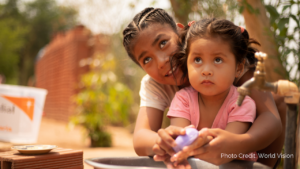Climate Change and its Effect on WASH
By Anderson Alleyne, Communications Consultant, Global Health Council

World Water Week 2021 was August 23-27 and brought together experts from across multiple sectors to discuss and create concrete solutions to a wide range of water-related issues. The theme of this year’s annual event was Building Resilience Faster and it focused on addressing one of the biggest challenges of our time: climate change. The latest report by the Intergovernmental Panel on Climate Change outlines the devastating effects of global warming such as rising sea levels, severe flooding, and worsening droughts. With water scarcity and extreme weather events becoming a regular occurrence, climate change also poses a risk to everyone having access to clean water, adequate sanitation, and proper hygiene (WASH).
Sustainable Development Goal 6 aims to ensure access to water and sanitation for all. Though global progress has been made on WASH, it is estimated that 3 billion people worldwide lack adequate facilities to safely wash their hands at home and more than 2 billion people worldwide do not have access to basic sanitation. Climate change has exacerbated this crisis as heavier storms have created sewage waste overflows and contaminated water sources. Additionally, due to longer droughts, people often have no choice but to drink unsafe water.
Having access to clean water and safe sanitation are vital for our health and well-being. Without it, poor WASH conditions have the potential to expose individuals to diseases such as cholera, diarrhea, dysentery, hepatitis A, typhoid, and polio. The COVID-19 pandemic has also highlighted long-standing inequalities in access to essential services, including WASH. According to the World Health Organization, 1 in 4 health care facilities lack basic water services, 1 in 3 does not have access to hand hygiene where care is provided, and 1 in 10 doesn’t have any sanitation services. Given that health care facilities play a crucial role in handling outbreaks of disease, it’s imperative that they are adequately equipped with climate-resilient and sustainable WASH services.
Fortunately, many of our members are working to improve water, sanitation, and hygiene access globally. WaterAid is campaigning for an increase in climate financing for water and sanitation to help low-income countries adapt and build resilience to climate impacts. Similarly, Chemonics and RTI International work with local communities, policymakers, and financial institutions to develop reliable and sustainable water infrastructure. See our members list to learn more about organizations that are working to provide WASH services for all.